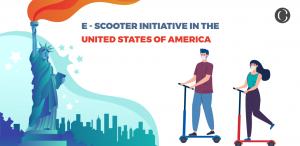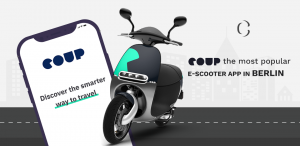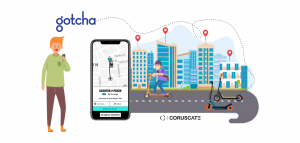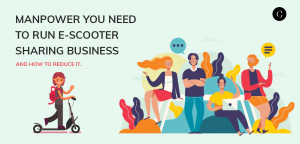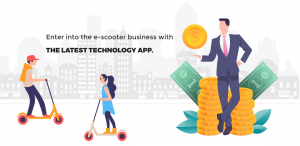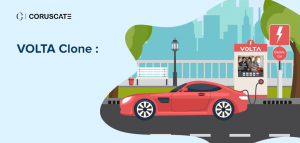Technology, regulations, top investors, opportunities and challenges all you need to know to build the e-scooter app in Istanbul, Turkey and start e-scooter sharing business.
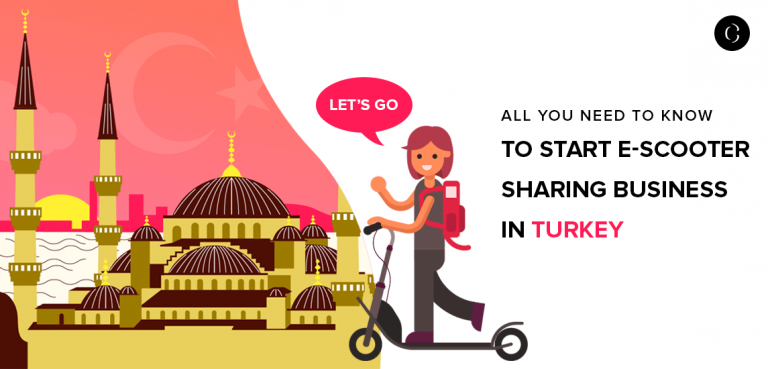
The global micro-mobility market which was valued at $3 billion in 2018, is projected to reach around $9.8 billion by 2025, at a CAGR of 19.9% between 2019 and 2025. Advancement in GPS tracking, connectivity, mobile payment, battery cost reduction and the increasing reach of the smartphones are the major factors causing transportation landscape witness massive growth and innovation.
The business model of the e-scooter sharing business is so commercially successful that a micro-mobility startup can break even in less than 4 months for vehicle acquisition costs of around $400 and the utilization rate of 5 rides a day.
Recently, after hitting the European market, USA market, the Latin American market and Australian market, the transportation revolution has now hit the Turkish market. People of major cities of Turkey who have been familiar with the car-sharing thanks to the top car-sharing companies like Zipcar and YOYO, have now started opting for micro-mobility vehicles to fight against traffic and climate change.
With only 1.3% person per car rate and less market competition, Turkish cities are going to be the most profitable micro-mobility markets in coming years. So, if you are planning to build the e-scooter app in Turkey and in its largest city Istanbul, keep reading this blog.
In this blog, we will discuss everything you need to know to start an electric scooter sharing business in Turkey by developing an e-scooter app. So, let’s start with the most common question:
Is it a safe bet to start an electric scooter sharing business in Turkey?
Yes, it is! Your micro-mobility business can easily be profitable in the Turkish market. And there are some strong reasons behind it.
- Economic Growth
The stronger the economy, the easier it is for businesses to be profitable! The economy of Turkey has grown around 5% since the last 3 years annually. And according to IMF, the economy of Turkey is expected to grow at the same pace in upcoming years.
- Population Growth
In many less populated cities, micro-mobility startups struggle to find potential users and usually end up finding only a few user groups. But in Turkish cities, the population is increasing by leaps and bounds. Population in Turkey has grown by 8.7% for the last 5 years and reached nearly 80 million. And most importantly, the working population has increased from 57.7% to 59% which is a hopeful sign for micro-mobility startups as working people are their major users.
- Congestion
One of the reasons why people opt more for e-scooter is congestion. The 6 major cities of Turkey have 25% more congestion than a standard limit. Whereas, the largest city in Turkey, Istanbul, has a 49% higher congestion than the standard limit. To quickly navigate through the congested streets, an e-scooter is the best mode of transportation.
- Investment on infrastructure
When it comes to infrastructure, micro-mobility vehicles have their own challenges. An e-scooter requires a wide sidewalk or dedicated bicycle lane where a rider can ride the e-scooter safely. Unsurprisingly, all major cities of Turkey have e-scooter friendly infrastructure because of a few billion dollars of investment on infrastructure.
- Connectivity
In Turkey, the individual internet rate is 66.8% and households with access to the internet are 80.7%. Which means, a micro-mobility startup can run an effective online marketing campaign & public awareness campaign and acquire a large user base.
However, like all other markets, the Turkish micro-mobility market has some challenges which you have to overcome before developing the e-scooter app in Turkey.
Challenges associated with Turkish micro-mobility (E Scooter business) market
(Though there are challenges associated with Turkish micro-mobility market, our business experts can help you to decode each of them.)
- Topography
The largest city in Turkey, Istanbul, is divided into two parts. Though several bridges are connecting both parts of the city, it is not feasible to ride e-scooters on those bridges which are huge and built for the fast movement of cars and other heavy vehicles. Meaning, you should divide the operation area of electric scooter sharing business by enabling the geo-fencing. Following image clearly depicts how Istanbul is divided into two parts by a strait.
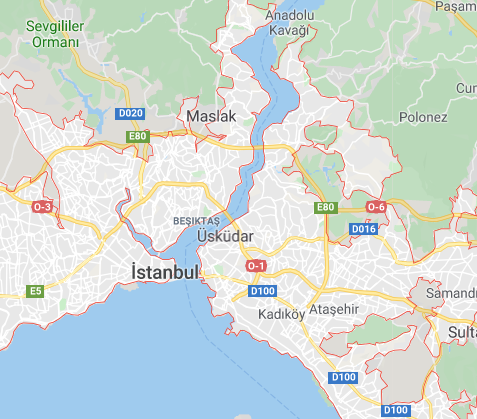
- Logistic
The heavy commercial vehicles are prohibited from entering in most Turkish cities between 6 to 10 AM and 4 to 10 PM. Meaning, you should not be able to relocate e-scooters in heavy vehicles during this period of time.
- Mountainous region
Majority of roads and streets of Istanbul have a higher degree of slope. On such roads, it becomes very difficult to ride the e-scooters which are powered by just 200-300 Wh of batteries. However, there are many high powered e-scooters available in the market which you can deploy in this geographically challenging business terrain.
You can also consider government regulations as the challenge as sometimes due to lack of knowledge and lack of monitoring features in the admin panel, an operator does not obey the laws and falls into legal trouble.
Following are the top rules related to the usage of e-scooter and e-bike imposed by the Turkish government.
- Any kind of electric vehicle over 0.25Kw and/or with a higher maximum speed of 25 Kmph should be registered.
- To ride a bike over 0.25 Kw you must hold a Motorbike Driving Licence.
- All e-scooters and e-bikes must be insured.
- Wearing a helmet while riding on the e-scooter or e-bike is compulsory.
So, now when you know both opportunities and challenges associated with Turkish micro-mobility market, let’s quickly talk about the micro-mobility stakeholders of the Turkish market.
Turkish micro-mobility market’s stakeholders including the investors
The Turkish micro-mobility market is composed of major 6 stakeholders who all interact with each other. Those 6 stakeholders are,
- Users and government
Users and the government are standing on the top. They act as the consumer and regulator. Government builds the regulations, prepares vision plans and gives incentives for startups. Whereas the users become the irreplaceable part of the sales life cycle of the micro-mobility startup.
- NGOs
Independent organizations track changes in the world, raise awareness, direct public authorities and develop scenarios.
- Startups
Startups are the vitally important stakeholder in the new micro-mobility market. They deploy e-scooters & mobile apps and interact with other stakeholders. Their interaction with other stakeholders defines the fate of their services.
- Investors
Investors include mainly venture capitalists and angel investors. Middle East Venture Partners, TEMSA, STC Ventures, Aselsan, Aslanoba Capital, BMW, Wamda Capital, STM, Renault, HummingBird, the Abraaj Group, Subaru and Saned are the top investors investing in the Turkish mobility market.
- Universities
Universities are responsible for applying their deep thinking into the sector to bring innovation in terms of hardware sustainability and operation. A micro-mobility startup can also tie-up with universities and deploy its e-scooters within the boundaries of universities.
- Technology partners
Technology partners include hardware providers as well as a software provider. The software provider employs all his expertise to build the mobile app for a micro-mobility startup. And to make sure that the app is connected with the fleet of e-scooters (hardware), the software provider coordinates with the hardware provider in either a direct or indirect way.
Looking for a technology partner to build the e-scooter app in Istanbul, Turkey? Know how much it costs.
Coruscate is the top e-scooter app development company which has developed 10 e-scooter apps including the app named Poke for Istanbul, Turkey. To develop the Poke app with the highest-ever success rate, we studied the Turkish market well. And thanks to that learning, we can easily develop another unsurpassable app for this region.
At Coruscate, we accommodate 100+ IoT engineers, app designers, app developers, research fellows, business experts and legal experts who all work together to make your business journey painless. Our business experts and legal experts help micro-mobility startups to study the market, prepare a business plan, decide on the business model and acquire the permit.
For startups having different requirements, we offer 3 different app development approaches. You can choose an approach according to your requirements.
To build the custom e-scooter app with all custom features, we charge somewhere between 15K to 25K.
To build the clone version of some popular e-scooter apps like Lime and Bird, the price starts from just $10K.
And our subscription plan which gives you a white label solution of e-scooter app and admin panel starts from just $500*.
To know more about the e-scooter app features, validate your business model, get the personalized quotation along with free e-scooter app demo and free consultation, please feel free to contact us.



